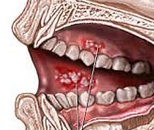Protect yourself from Oral Cancer
Although not as prevalent as other forms of cancer such as lung, breast, and colon cancer, oral cancer still lurks its ugly face in America and worldwide. According to the Oral Cancer Society Foundation, approximately 44,000 Americans will be diagnosed this year with oral cancer, and 8000 deaths will be contributed to it. These numbers are significant enough that it deserves serious preventive measures.

Traditionally, tobacco and alcohol use has been the major causative agent of oral cancer. However, more recently, the increased incidence of oral cancer is being largely blamed on the Human Papilloma Virus 16, or HPV16 for short. This is the same virus responsible for over 90% of all cervical cancers.
Oral cancers are so dangerous because they often are undetectable in the initial stages, which allows for secondary spread to other body parts. They tend not to hurt, and no physical color changes may be apparent. It is estimated that over 20% of oral cancers have a high chance of developing into a secondary cancer elsewhere. Most oral cancers are seen in patients over the age of 40, with it affecting males 2:1 over women, and black Americans twice as much as white Americans.
The question to ask is," How can we prevent this?" Besides being diligent to inspect your own body of any changes in the appearance or comfort, the best line of defense lies at the dental office. Dentists and hygienists are specifically trained to look for the signs and symptoms of oral cancer. As a Naples dentist, I have personally diagnosed several oral lesions that required further treatment. I regularly perform oral cancer screenings at the office, and all new patients are required to have one. We look for the warning signs, such as: a white or red patch which may or may not be ulcerated, which doesn't heal in 2 weeks, a lump or mass, pain upon swallowing, or a hoarseness in the voice.
The best treatment for oral cancer is to avoid it, and early detection is vital to survival. If you, or a loved one is concerned with the possibility of oral cancer, please schedule a comprehensive dental evaluation just to be safe.
